- Home
- Franklin W. Dixon
The Tower Treasure Page 7
The Tower Treasure Read online
Page 7
Frank said nothing to her about being concerned over his father, as he tucked the ham under one arm and picked up the cakebax. But after he and Callie reached the street, he again confided his concern to Callie.
“It does seem strange you haven’t heard anything,” she admitted. “But don’t forget the old saying, ‘No news is good news,’ so don’t worry.”
“I’ll take your advice,” Frank agreed. “No use wearing a sour look around the Robinsons.”
“Or when you’re with me, either,” Callie said, tossing her head teasingly.
Frank hailed an approaching bus bound for the section of the city in which the Robinsons lived. He and Callie climbed aboard. It was a long ride and the streets became less attractive as they neared the outskirts of Bayport.
“It’s a shame, that’s what it is!” declared Callie abruptly. “The Robinsons were always accustomed to having everything so nice! And now they have to live here! Oh, I hope your father catches the man who committed that robbery—and soon!”
Her eyes flashed and for a moment she looked so fierce that Frank laughed.
“I suppose you’d like to be the judge and jury at his trial, eh?”
“I’d give him a hundred years in jail!” Callie declared.
When they came to the street where the Robinsons had moved they found that it was an even poorer thoroughfare than they had expected. There were small houses badly in need of paint and repairs. Shabbily dressed children were playing in the roadway.
At the far end of the street stood a small cottage that somehow contrived to look homelike in spite of the surroundings. The picket fence had been repaired and the yard had been cleaned up.
“This is where they live,” said Frank.
Callie smiled. “It’s the neatest place on the whole street.”
Paula and Tessie answered their knock. The twins’ faces lighted up with pleasure when they saw who the callers were.
“Frank and Callie!” they exclaimed. “Come in.”
The callers were greeted with kindly dignity by Mrs. Robinson. She looked pale and thin but had the same self-possession she had always shown at Tower Mansion.
“We can’t stay long,” Callie explained. “But Frank and I just thought we’d run out to see how you all are. And we brought something for you.”
The fruit, ham, and cake were presented. As the twins ohed and ahed over the food, Mrs. Robinson’s eyes filled with tears. “You are dear people,” she said. “Frank, tell your mother I can’t thank her enough.”
Frank grinned as Mrs. Robinson went on, “Callie, we shall enjoy this fruit very much. Many thanks.”
Paula said, “It’s a wonderful gift. Say, did you know Perry got a better job the second day he was at the supermarket?”
“No. That’s swell,” Frank replied. “It didn’t take the manager long to find out how smart Slim is, eh?”
The twins giggled, but Mrs. Robinson said dolefully, “I wish my husband could find a job. Since no one around here will employ him, he is thinking of going to another city to get work.”
“And leave you here?”
“I suppose so. We don’t know what to do.”
“It’s so unfair!” Paula flared up. “My father didn’t have a thing to do with that miserable robbery, and yet he has to suffer for it just the same!”
Mrs. Robinson said to Frank hesitantly, “Has Mr. Hardy discovered anything—yet?”
“I don’t know,” Frank admitted. “We haven’t heard from him. He’s been in New York following up some clues. But so far there’s been no word.”
“We hardly dare hope that he’ll be able to clear Mr. Robinson,” the woman said sorrowfully. “The whole case is so mysterious.”
“I’ve stopped thinking of it,” Tessie declared. “If the mystery is cleared up, okay. If it isn’t—we won’t starve, at any rate, and my father knows we believe in him.”
“Yes, I suppose it doesn’t do much good to keep talking about it,” agreed Mrs. Robinson. “We’ve gone over the whole matter so thoroughly that there is nothing more to say.”
So, by tacit consent, the subject was changed and for the rest of their stay Frank and Callie chatted of doings at school. Mrs. Robinson and the girls invited them to remain for supper, but Callie insisted that she must go. As they were leaving, Mrs. Robinson drew Frank to one side.
“Promise me one thing,” she said. “Let me know as soon as your father returns—that is, if he has any news.”
“I’ll do that, Mrs. Robinson,” Frank agreed. “I know what this suspense must be like for you and the twins.”
“It’s terrible. But as long as Fenton Hardy—and his sons—are working on the case, I’m sure it will be straightened out.”
Callie and Frank were unusually silent all the way home. They had been profoundly affected by the change that the Tower Mansion mystery had caused in the lives of the Robinsons. Callie lived but a few blocks from the Hardy home, and Frank accompanied her to the door.
“See you tomorrow,” he said.
“Yes, Frank. And I hope you’ll hear good news from your father.”
The boy quickened his steps and ran eagerly into the Hardy house. Joe met him.
“Any phone call?”
Joe shook his head. “Mother’s pretty worried that something has happened to Dad.”
CHAPTER XII
A Disturbing Absence
ANOTHER whole day went by. When still no word had come from Mr. Hardy, his wife phoned the New York hotel. She was told that the detective had checked out the day before.
Discouraged and nervous about the new mystery of their father’s disappearance, Frank and Joe found it almost impossible to concentrate on their studies.
Then, the following morning when Mrs. Hardy came to awaken them, she wore a broad smile. “Your father is home!” she said excitedly. “He’s all right but has had a bad time. He’s asleep now and will tell you everything after school.”
The boys were wild with impatience to learn the outcome of his trip, but they were obliged to curb their curiosity.
“Dad must be mighty tired,” Joe remarked, as Mrs. Hardy went downstairs to start breakfast. “I wonder where he came from.”
“Probably he was up all night. When he’s working on a case, he forgets about sleep. Do you think he found out anything?”
“Hope so, Frank. I wish he’d wake up and tell us. I hate to go back to school without knowing.”
But Mr. Hardy had not awakened by the time the boys set out for school, although they lingered until they were in danger of being late. As soon as classes were over, they shattered all records in their race home.
Fenton Hardy was in the living room, and as they rushed in panting, he grinned broadly. He looked refreshed after his long sleep and it was evident that his trip had not been entirely without success, for his manner was cheerful.
“Hello, boys! Sorry I worried you and Mother.”
“What luck, Dad?” asked Frank.
“Good and bad. Here’s the story: I went to the house where Red Jackley was boarding. Although he seemed to be an exemplary parolee, I decided to watch him a while and try to make friends.”
“How could you do that?”
“By taking a room in the same house and pretending to be a fellow criminal.”
“Wow!” Joe cried. “And then?”
“Jackley himself spoiled everything. He got mixed up in a jewel robbery and cleared out of the city. Luckily, I heard him packing, and I trailed him. The police were watching for him and he couldn’t get out of town by plane or bus. He outwitted the police by jumping a freight on the railroad.”
“And you still followed?”
“I lost him two or three times, but fortunately I managed to pick up his trail again. He got out of the city and into upper New York State. Then his luck failed him. A railroad detective recognized Jackley and the chase was on. Up to that time I had been content with just keeping behind him. I had still hoped to pose as a fellow fugitive and w
in his confidence. But when the pursuit started in earnest, I had to join the officers.”
“And they caught Jackley?”
“Not without great difficulty. Jackley, by the way, was once a railroad man. Strangely enough, he worked not many miles from here. He managed to steal a railroad handcar and got away from us. But he didn’t last long, for the handcar jumped the tracks on a curve and Jackley was badly smashed up.”
“Killed?” Frank asked quickly.
“No. But he’s in a hospital right now and the doctors say he hasn’t much of a chance.”
“He’s under arrest?”
“Oh, yes. He’s being held for the jewel thefts and also for the theft from the actor’s dressing room. But he probably won’t live to answer either charge.”
“Didn’t you find out anything that would connect him with the Tower robbery?”
“Not a thing.”
The boys were disappointed, and their expressions showed it. If Red Jackley died without confessing, the secret of the Tower robbery would die with him. Mr. Robinson might never be cleared. He might be doomed to spend the rest of his life under a cloud, suspected of being a thief.
“Have you talked to Jackley?” Frank asked.
“I didn’t have a chance—he wasn’t conscious.”
“Then you may never be able to get a confession from him.”
Fenton Hardy shrugged. “I may be able to. If Jackley regains consciousness and knows he’s going to die, he may admit everything. I intend to see him in the hospital and ask him about the Tower robbery.”
“Is he far away?”
“Albany. I explained my mission to the doctor in charge and he promised to telephone me as soon as it was possible for Jackley to see anyone.”
“You say he used to work near here?” Joe asked.
“He was once employed by the railroad, and he knows all the country around here well. Then he became mixed up in some thefts from freight cars, and after he got out of jail, turned professional criminal. I suppose he came back here because he is so familiar with this area.”
“I promised to call Mrs. Robinson,” Frank spoke up. “Okay to tell her about Jackley?”
“Yes, it may cheer her up. But ask her not to tell anyone.”
Frank dialed the number and relayed part of his father’s story. The accused man’s wife was overwhelmed and relieved by the news, but promised not to divulge the information. Just as Frank finished the call, the doorbell rang. Frank ushered in the private detective Oscar Smuff.
“Your pa home?” he asked.
“Yes. Come in.” Frank led the way into the living room.
Smuff, although he considered himself a top-notch sleuth, stood in awe of Fenton Hardy. He cleared his throat nervously.
“Good afternoon, Oscar,” said Mr. Hardy pleasantly. “Won’t you sit down?”
Detective Smuff eased himself into an armchair, then glanced inquiringly at the two boys. At once Mr. Hardy said, “Unless your business is very private, I’d like to have my sons stay.”
“Well, I reckon that’ll be all right,” Smuff conceded. “I hear you’re working on this Applegate case.”
“Perhaps I am.”
“You’ve been out of town several days,” Smuff remarked cannily, “so I deduced you must be workin’ on it.”
“Very clever of you, Detective Smuff,” Mr. Hardy said, smiling at his visitor.
Smuff squirmed uneasily in his chair. “I’m workin’ on this case too—I’d like to get that thousand-dollar reward, but I’d share it with you. I was just wonderin’ if you’d found any clues.”
Mr. Hardy’s smile faded. He said, with annoyance, “If I went away, it is my own business. And if I’m working on the Tower robbery, that also is my business. You’ll have to find your own clues, Oscar.”
“Well, now, don’t get on your high horse, Mr. Hardy,” the visitor remonstrated. “I’m just anxious to get this affair cleared up and I thought we might work together. I heard you were with the officers what chased this here notorious criminal Red Jackley.”
Mr. Hardy gave a perceptible start. He had no idea that news of the capture of Jackley had reached Bayport, much less that his own participation in the chase had become known. The local police must have received the information and somehow Smuff had heard the news.
“What of it?” Mr. Hardy asked in a casual way.
“Did Jackley have anything to do with the Tower case?”
“How should I know?”
“Wasn’t that what you were warkin’ on?”
“As I’ve told you, that’s my affair.”
Detective Smuff looked sad. “I guess you just don’t want to co-operate with me, Mr. Hardy. I was thinkin’ of goin’ over to the hospital where this man Jackley is and questionin’ him about the case.”
Mr. Hardy’s lips narrowed into a straight line. “You can’t do that, Oscar. He isn’t conscious. The doctor won’t let you see him.”
“I’m goin’ to try. Jackley’ll come to some time and I want to be on hand. There’s a plane at six o’clock, and I aim to leave my house about five-thirty and catch it.” He thumped his chest in admiration. “Detectives don’t have to show up for a plane till the last minute, eh, Mr. Hardy? Well, I’ll have a talk with Jackley tonight. And I may let you know what he says.”
“Have it your own way,” said Mr. Hardy. “But if you take my advice you’ll not visit the hospital. You’ll just spoil everything. Jackley will talk when the times comes.”
“So there is somethin’ in it!” Smuff said triumphantly. “Well, I’m goin’ over there and get a confession!” With that he arose, stumped out of the room, and left the house.
CHAPTER XIII
Teamwork
AFTER Smuff left the house, Mr. Hardy sat back with a gesture of despair. “That man,” he said, “handles an investigation so clumsily that Red Jackley will close up like a clam if Smuff manages to question him.”
At that moment the telephone rang. The boys listened excitedly as Mr. Hardy answered. “Hello.... Oh, yes, doctor.... Is that so? ... Jackley will probably live only until morning? ... I can see him.... Fine.... Thank you. Good-by.”
The detective put back the receiver and turned to the boys. “I’ll take that six-o’clock plane to Albany. But if Smuff goes too, it may ruin everything. The Albany police and I must question Jackley first.”
“When’s the next commercial flight after six?” Joe asked.
“Seven o’clock.”
“Then,” said Frank, “Smuff can take that one and question Jackley later. Come on, Joe. Let’s see what we can do to help Dad!”
“Don’t you boys do anything rash,” their father warned.
“We won’t.”
Frank led the way outdoors and started walking down the street.
“What’s on your mind?” Joe asked as they reached the corner.
“We must figure out how to keep Detective Smuff in Bayport until seven o’clock.”
“But how?”
“I don’t know yet, but we’ll find a way. We can’t have him bursting into that hospital room and spoiling the chance of Dad’s getting a confession. Smuff might ruin things so the case will never be solved.”
“You’re right.”
The brothers walked along the street in silence. They realized that the situation was urgent. But though they racked their brains trying to think of a way to prevent Detective Smuff from catching the six-o’clock plane, it seemed hopeless.
“Let’s round up our gang,” Joe suggested finally. “Perhaps they’ll have some ideas.”
The Hardys found their friends on the tennis courts of Bayport High.
“Hi, fellows!” called Chet Morton when he saw Frank and Joe approaching. “You’re too late for a game. Where’ve you been?”
“We had something important to do,” Frank replied. “Say, we need your help.”
“What’s the matter?” asked Tony Prito.
“Oscar Smuff is trying to win that thousand-do
llar reward and get himself on the Bayport police force by interfering in one of Dad’s cases,” Frank explained. “We can’t tell you much more than that. But the main thing is, we want to keep him from catching the six-o’clock plane. We—er—don’t want him to go until seven.”
“What do you want us to do?” Bill Hooper asked.
“Help us figure out how to keep Smuff in Bayport until seven o’clock.”
“Without having Chief Collig lock us up?” Jerry Gilroy put in. “Are you serious about this, Frank?”
“Absolutely. If Smuff gets to a certain place before Dad can, the case will be ruined. And I don’t mind telling you that it has something to do with Slim Robinson.”
Chet Morton whistled. “Oh, ho! I catch on. The Tower business. If that’s it, we’ll make sure the six-o’clock plane leaves here without that nutty detective.” Chet had a special dislike for Smuff, because the man had once reported him for swimming in the bay after hours.
“So our problem,” said Phil solemnly, “is to keep Smuff here and keep out of trouble ourselves.”
“Right.”
“Well,” Jerry Gilroy said, “let’s put our heads together, fellows, and work out a plan.”
A dozen ideas were put forth, each wilder than the one before. Biff Hooper, with a wide grin, went so far as to propose kidnaping Smuff, binding him hand and foot, and setting him adrift in the bay in an open boat.
“We could rescue him later,” he said. The proposal was so ridiculous that the others howled with laughter.
Phil Cohen suggested setting the detective’s watch back an hour. That plan, as Frank observed, was a good one except for the minor difficulty of laying hands on the watch.
“We might send him a warning not to take a plane before seven o’clock,” Tony Prito said, “and sign it with a skull and crossbones.”
“That’s a keen ideal” Chet cried enthusiastically . “Let’s do it!”
“Wait a minute, fellows,” Frank spoke up. “If Smuff ever found out who wrote it, we’d be up to our necks in trouble. We could all be arrested!”
“I know!” Joe cried suddenly, snapping his fingers. “Why didn’t I think of it before? And it’s so simple, too.”

 The Great Pumpkin Smash
The Great Pumpkin Smash Who Let the Frogs Out?
Who Let the Frogs Out? Return to Black Bear Mountain
Return to Black Bear Mountain A Treacherous Tide
A Treacherous Tide Bug-Napped
Bug-Napped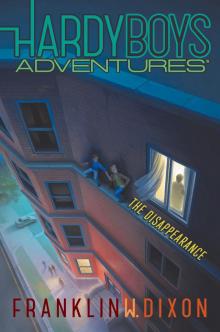 The Disappearance
The Disappearance Sea Life Secrets
Sea Life Secrets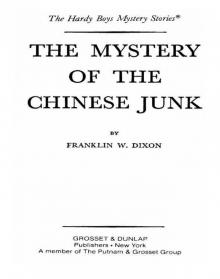 The Mystery of the Chinese Junk
The Mystery of the Chinese Junk A Skateboard Cat-astrophe
A Skateboard Cat-astrophe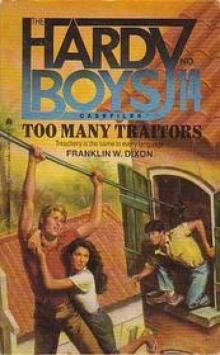 Too Many Traitors
Too Many Traitors Galaxy X
Galaxy X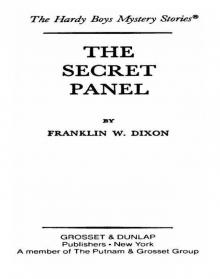 The Secret Panel
The Secret Panel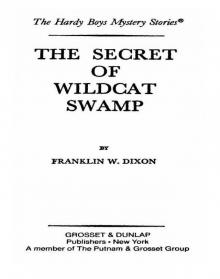 The Secret of Wildcat Swamp
The Secret of Wildcat Swamp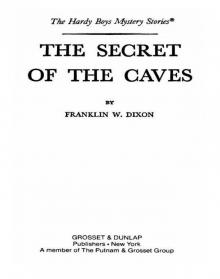 The Secret of the Caves
The Secret of the Caves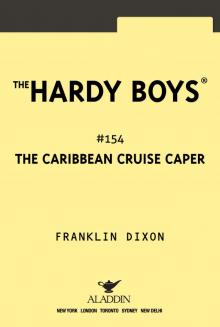 The Caribbean Cruise Caper
The Caribbean Cruise Caper Without a Trace
Without a Trace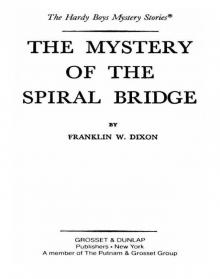 The Mystery of the Spiral Bridge
The Mystery of the Spiral Bridge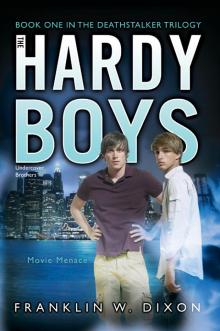 Movie Menace
Movie Menace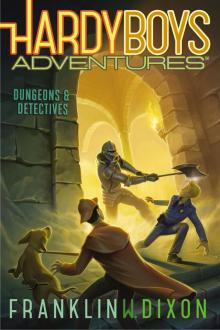 Dungeons & Detectives
Dungeons & Detectives Water-Ski Wipeout
Water-Ski Wipeout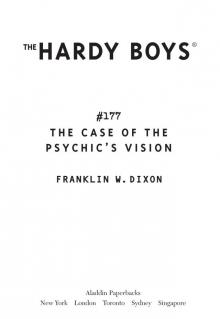 The Case of the Psychic's Vision
The Case of the Psychic's Vision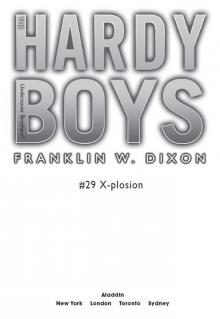 X-plosion
X-plosion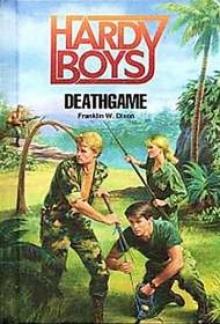 Deathgame
Deathgame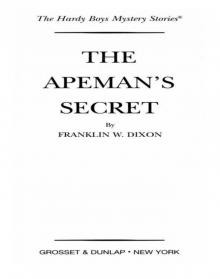 The Apeman's Secret
The Apeman's Secret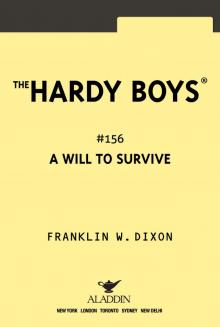 A Will to Survive
A Will to Survive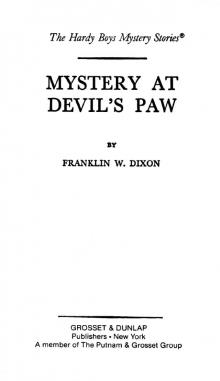 Mystery at Devil's Paw
Mystery at Devil's Paw Blood Money
Blood Money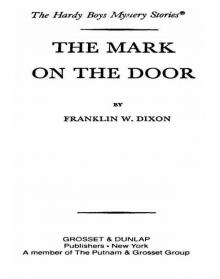 The Mark on the Door
The Mark on the Door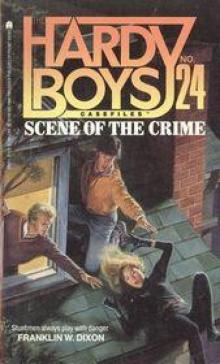 Scene of the Crime
Scene of the Crime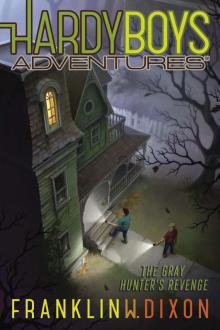 The Gray Hunter's Revenge
The Gray Hunter's Revenge Stolen Identity
Stolen Identity The Mummy's Curse
The Mummy's Curse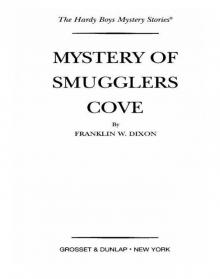 Mystery of Smugglers Cove
Mystery of Smugglers Cove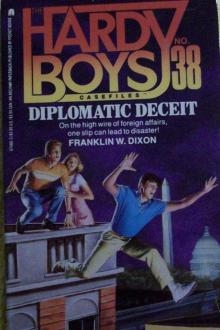 Diplomatic Deceit
Diplomatic Deceit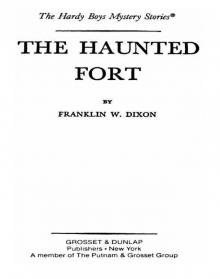 The Haunted Fort
The Haunted Fort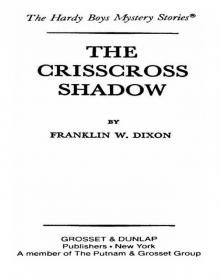 The Crisscross Shadow
The Crisscross Shadow Secret of the Red Arrow
Secret of the Red Arrow Trial and Terror
Trial and Terror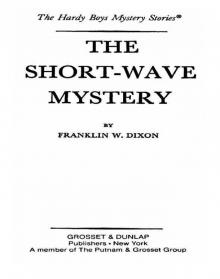 The Short-Wave Mystery
The Short-Wave Mystery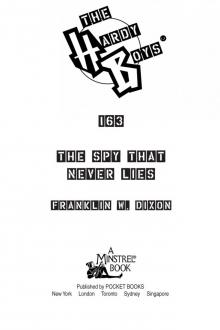 The Spy That Never Lies
The Spy That Never Lies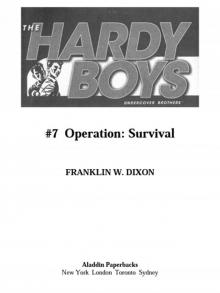 Operation: Survival
Operation: Survival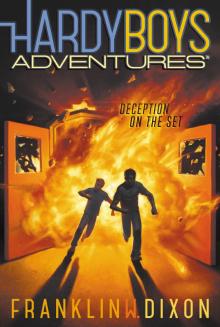 Deception on the Set
Deception on the Set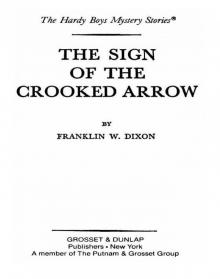 The Sign of the Crooked Arrow
The Sign of the Crooked Arrow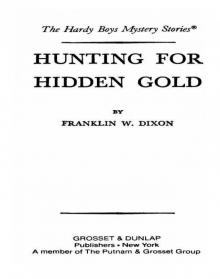 Hunting for Hidden Gold
Hunting for Hidden Gold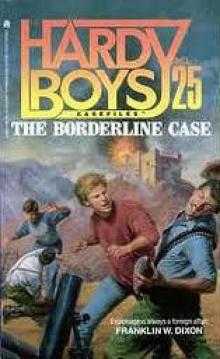 Disaster for Hire
Disaster for Hire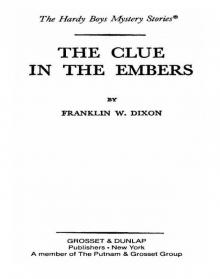 The Clue in the Embers
The Clue in the Embers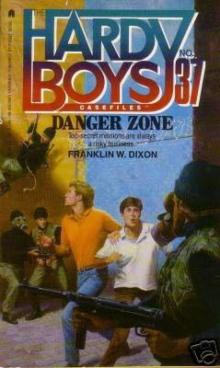 Danger Zone
Danger Zone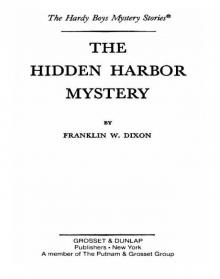 The Hidden Harbor Mystery
The Hidden Harbor Mystery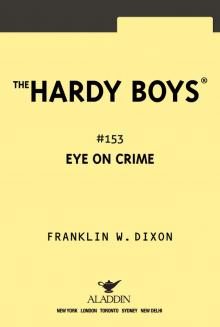 Eye on Crime
Eye on Crime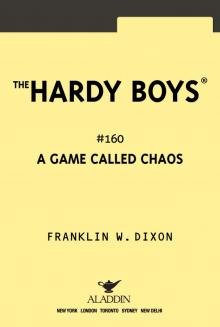 A Game Called Chaos
A Game Called Chaos The Bicycle Thief
The Bicycle Thief The Missing Playbook
The Missing Playbook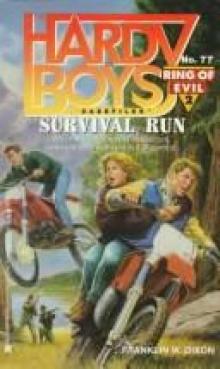 Survival Run
Survival Run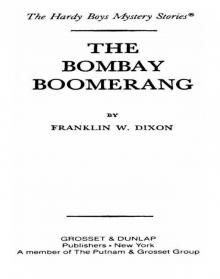 The Bombay Boomerang
The Bombay Boomerang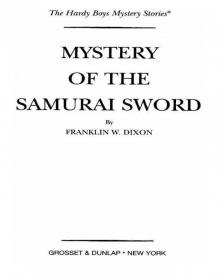 Mystery of the Samurai Sword
Mystery of the Samurai Sword Burned
Burned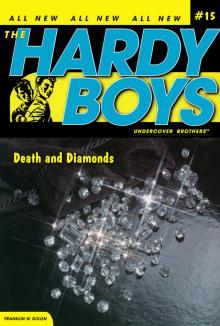 Death and Diamonds
Death and Diamonds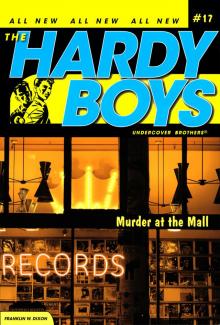 Murder at the Mall
Murder at the Mall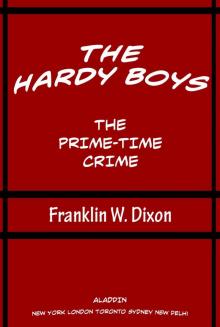 The Prime-Time Crime
The Prime-Time Crime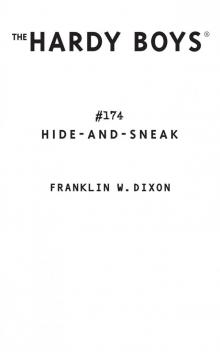 Hide-and-Sneak
Hide-and-Sneak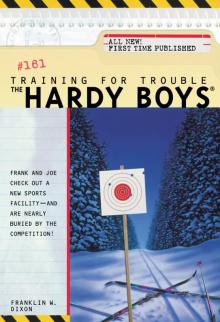 Training for Trouble
Training for Trouble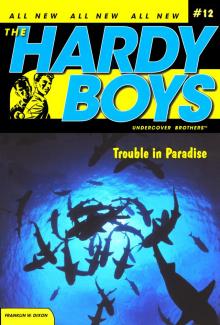 Trouble in Paradise
Trouble in Paradise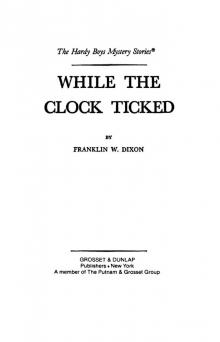 While the Clock Ticked
While the Clock Ticked The Alaskan Adventure
The Alaskan Adventure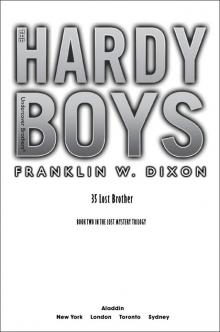 The Lost Brother
The Lost Brother Tunnel of Secrets
Tunnel of Secrets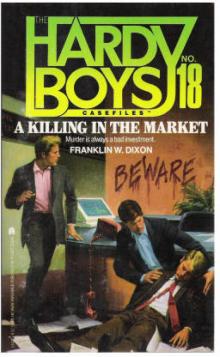 A Killing in the Market
A Killing in the Market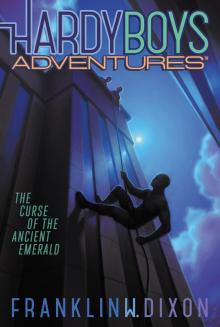 The Curse of the Ancient Emerald
The Curse of the Ancient Emerald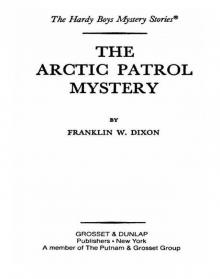 The Arctic Patrol Mystery
The Arctic Patrol Mystery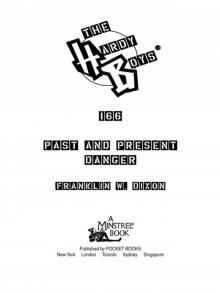 Past and Present Danger
Past and Present Danger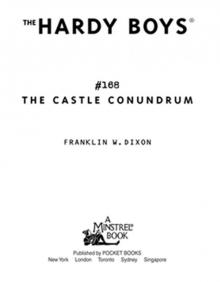 The Castle Conundrum (Hardy Boys)
The Castle Conundrum (Hardy Boys)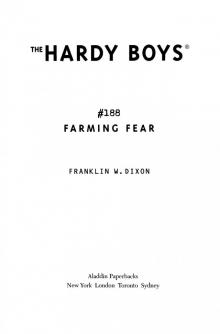 Farming Fear
Farming Fear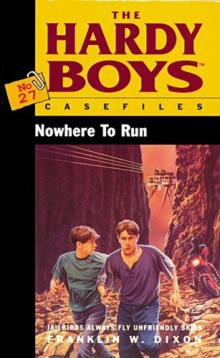 Nowhere to Run
Nowhere to Run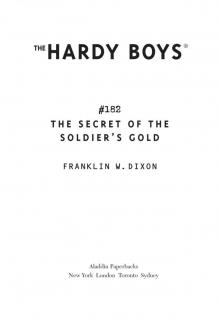 The Secret of the Soldier's Gold
The Secret of the Soldier's Gold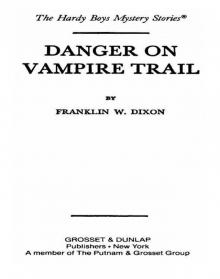 Danger on Vampire Trail
Danger on Vampire Trail The Lure of the Italian Treasure
The Lure of the Italian Treasure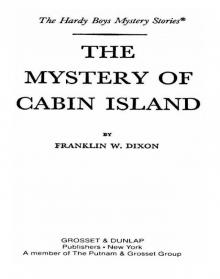 The Mystery of Cabin Island
The Mystery of Cabin Island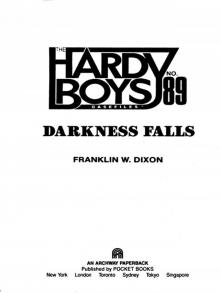 Darkness Falls
Darkness Falls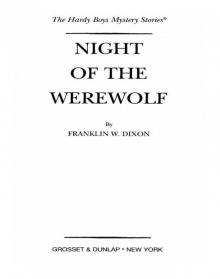 Night of the Werewolf
Night of the Werewolf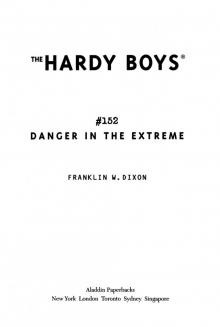 Danger in the Extreme
Danger in the Extreme The Lazarus Plot
The Lazarus Plot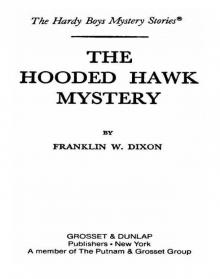 The Hooded Hawk Mystery
The Hooded Hawk Mystery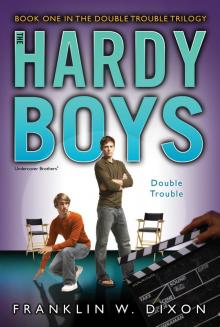 Double Trouble
Double Trouble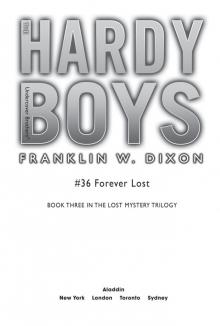 Forever Lost
Forever Lost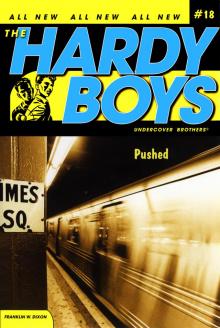 Pushed
Pushed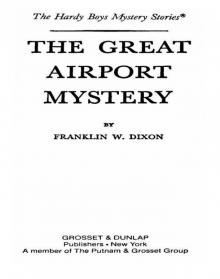 The Great Airport Mystery
The Great Airport Mystery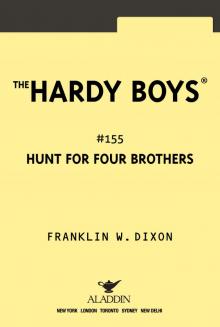 The Hunt for Four Brothers
The Hunt for Four Brothers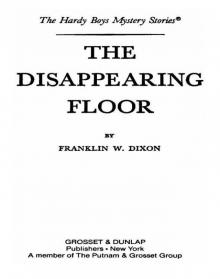 The Disappearing Floor
The Disappearing Floor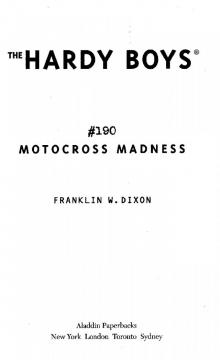 Motocross Madness
Motocross Madness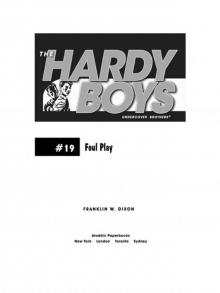 Foul Play
Foul Play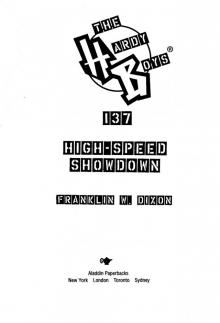 High-Speed Showdown
High-Speed Showdown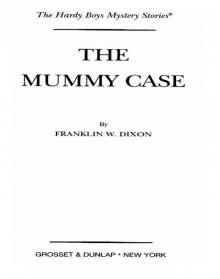 The Mummy Case
The Mummy Case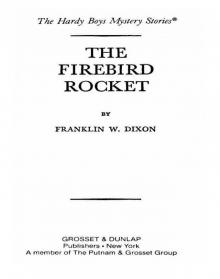 The Firebird Rocket
The Firebird Rocket Trouble in Warp Space
Trouble in Warp Space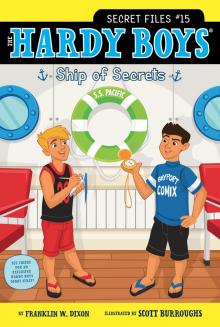 Ship of Secrets
Ship of Secrets Line of Fire
Line of Fire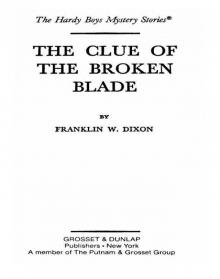 The Clue of the Broken Blade
The Clue of the Broken Blade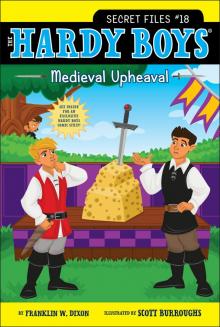 Medieval Upheaval
Medieval Upheaval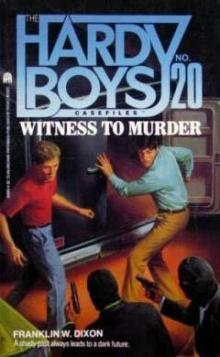 Witness to Murder
Witness to Murder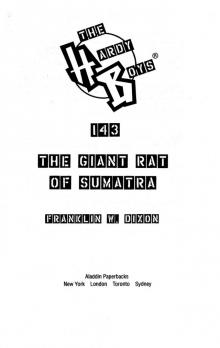 The Giant Rat of Sumatra
The Giant Rat of Sumatra Attack of the Bayport Beast
Attack of the Bayport Beast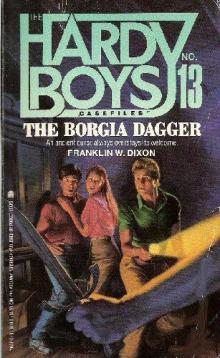 The Borgia Dagger
The Borgia Dagger Scavenger Hunt Heist
Scavenger Hunt Heist No Way Out
No Way Out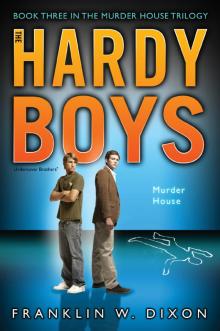 Murder House
Murder House The X-Factor
The X-Factor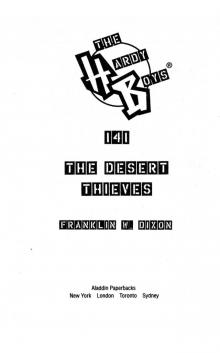 The Desert Thieves
The Desert Thieves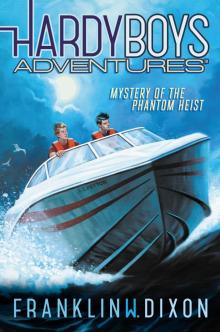 Mystery of the Phantom Heist
Mystery of the Phantom Heist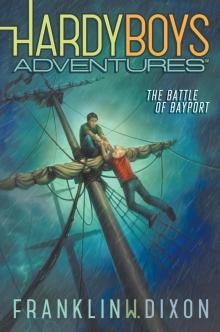 The Battle of Bayport
The Battle of Bayport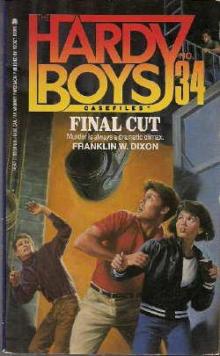 Final Cut
Final Cut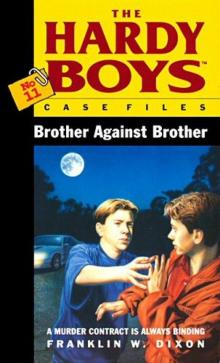 Brother Against Brother
Brother Against Brother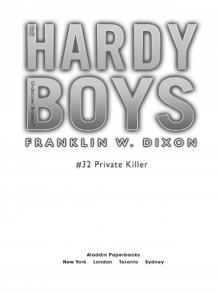 Private Killer
Private Killer The Mystery of the Black Rhino
The Mystery of the Black Rhino Feeding Frenzy
Feeding Frenzy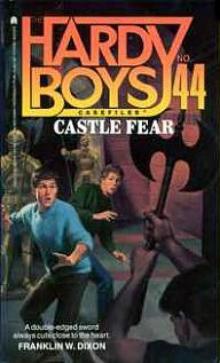 Castle Fear
Castle Fear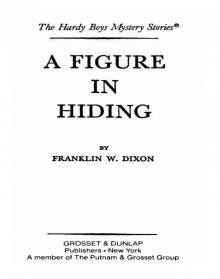 A Figure in Hiding
A Figure in Hiding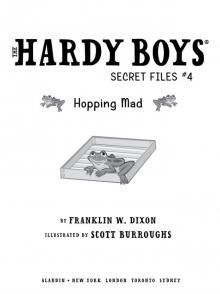 Hopping Mad
Hopping Mad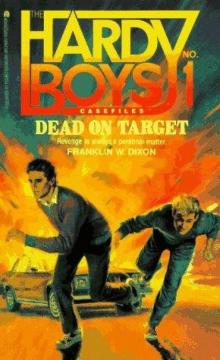 Dead on Target
Dead on Target Skin and Bones
Skin and Bones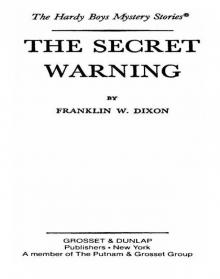 The Secret Warning
The Secret Warning Flesh and Blood
Flesh and Blood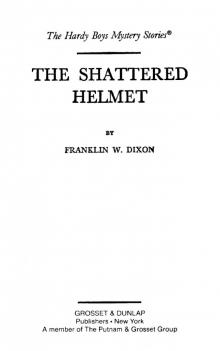 The Shattered Helmet
The Shattered Helmet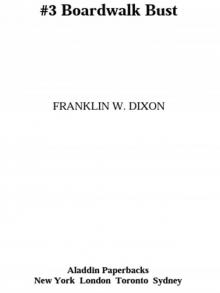 Boardwalk Bust
Boardwalk Bust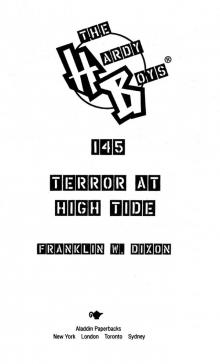 Terror at High Tide
Terror at High Tide In Plane Sight
In Plane Sight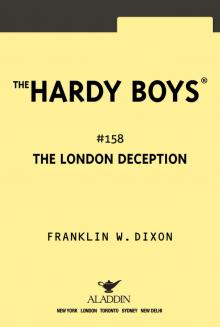 The London Deception
The London Deception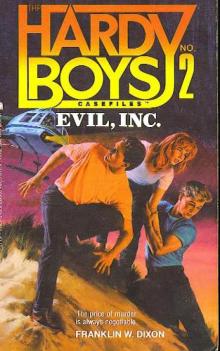 Evil, Inc.
Evil, Inc.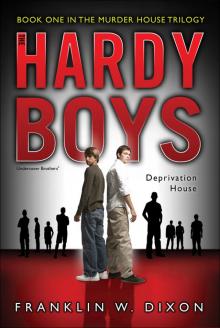 Deprivation House
Deprivation House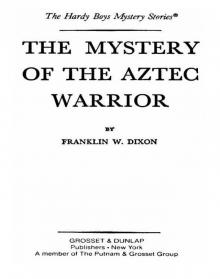 The Mystery of the Aztec Warrior
The Mystery of the Aztec Warrior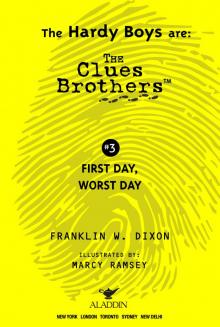 First Day, Worst Day
First Day, Worst Day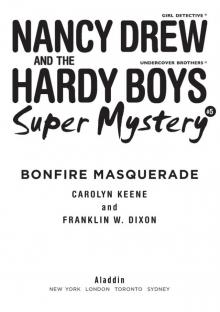 Bonfire Masquerade
Bonfire Masquerade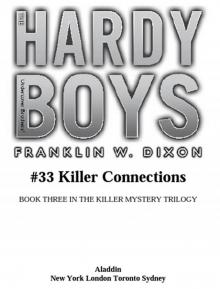 Killer Connections
Killer Connections Strategic Moves
Strategic Moves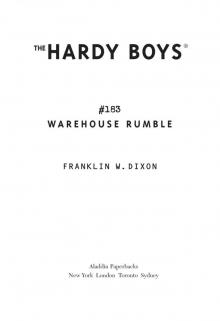 Warehouse Rumble
Warehouse Rumble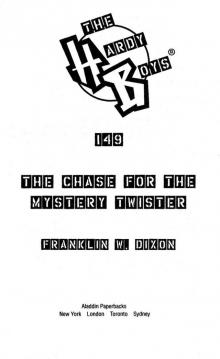 The Chase for the Mystery Twister
The Chase for the Mystery Twister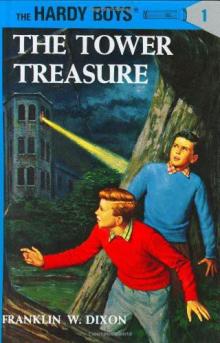 The Tower Treasure thb-1
The Tower Treasure thb-1 The Children of the Lost
The Children of the Lost The Last Laugh
The Last Laugh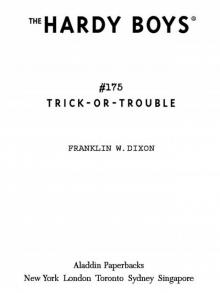 Trick-or-Trouble
Trick-or-Trouble Perfect Getaway
Perfect Getaway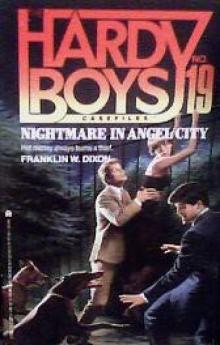 Nightmare in Angel City
Nightmare in Angel City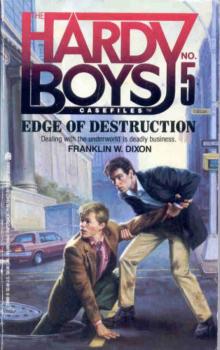 Edge of Destruction
Edge of Destruction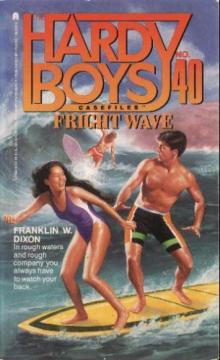 Fright Wave
Fright Wave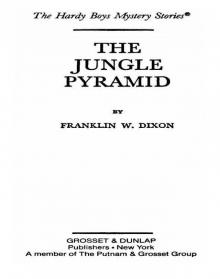 The Jungle Pyramid
The Jungle Pyramid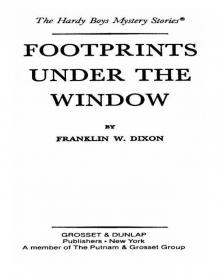 Footprints Under the Window
Footprints Under the Window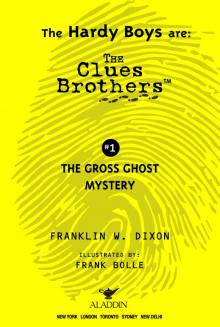 The Gross Ghost Mystery
The Gross Ghost Mystery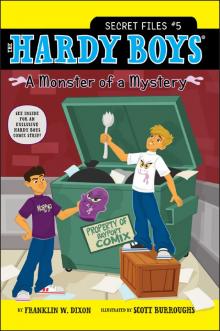 A Monster of a Mystery
A Monster of a Mystery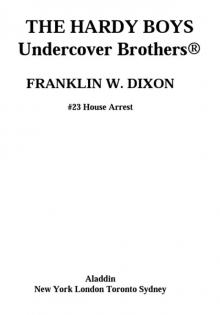 House Arrest
House Arrest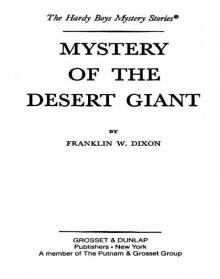 Mystery of the Desert Giant
Mystery of the Desert Giant Talent Show Tricks
Talent Show Tricks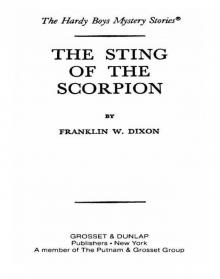 The Sting of the Scorpion
The Sting of the Scorpion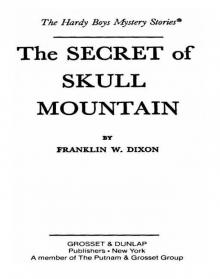 The Secret of Skull Mountain
The Secret of Skull Mountain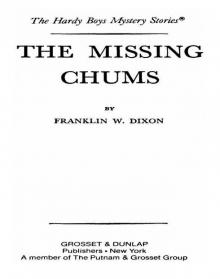 The Missing Chums
The Missing Chums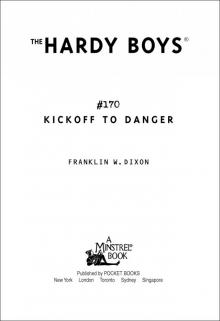 Kickoff to Danger
Kickoff to Danger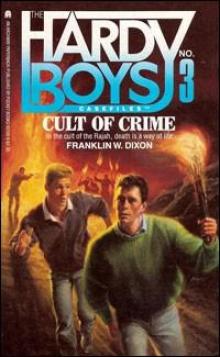 Cult of Crime
Cult of Crime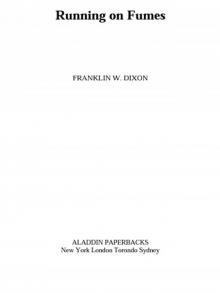 Running on Fumes
Running on Fumes Martial Law
Martial Law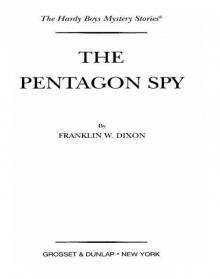 The Pentagon Spy
The Pentagon Spy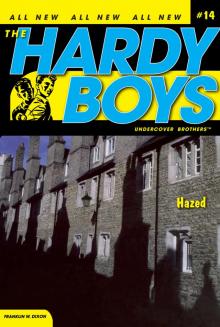 Hazed
Hazed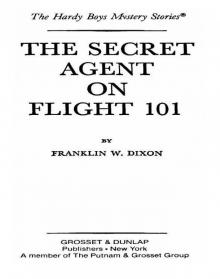 The Secret Agent on Flight 101
The Secret Agent on Flight 101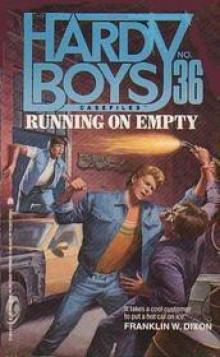 Running on Empty
Running on Empty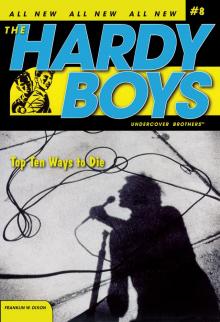 Top Ten Ways to Die
Top Ten Ways to Die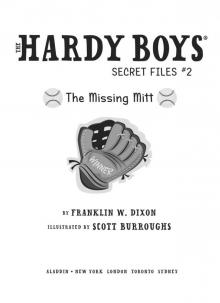 The Missing Mitt
The Missing Mitt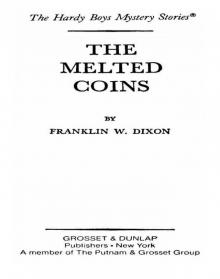 The Melted Coins
The Melted Coins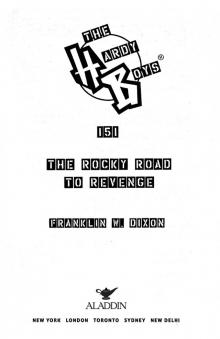 The Rocky Road to Revenge
The Rocky Road to Revenge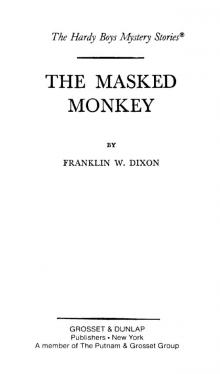 The Masked Monkey
The Masked Monkey Lost in Gator Swamp
Lost in Gator Swamp Extreme Danger
Extreme Danger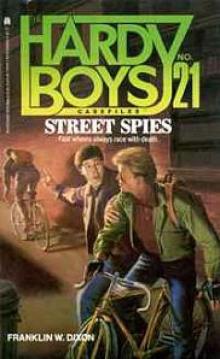 Street Spies
Street Spies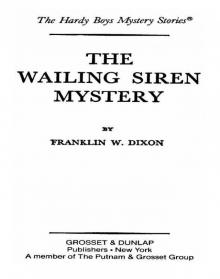 The Wailing Siren Mystery
The Wailing Siren Mystery The Dangerous Transmission
The Dangerous Transmission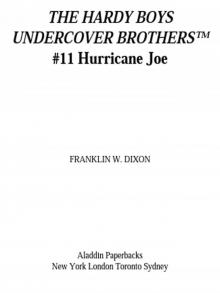 Hurricane Joe
Hurricane Joe The Crisscross Crime
The Crisscross Crime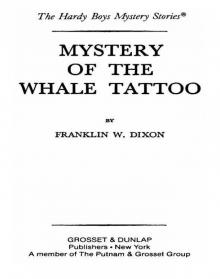 Mystery of the Whale Tattoo
Mystery of the Whale Tattoo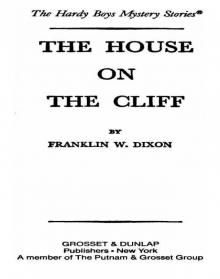 The House on the Cliff
The House on the Cliff Camping Chaos
Camping Chaos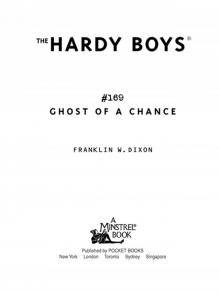 Ghost of a Chance
Ghost of a Chance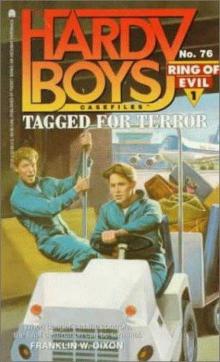 Tagged for Terror
Tagged for Terror Thrill Ride
Thrill Ride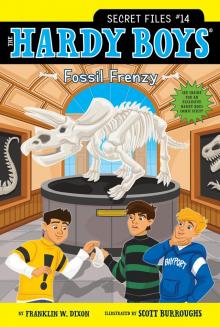 Fossil Frenzy
Fossil Frenzy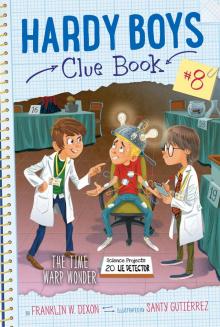 The Time Warp Wonder
The Time Warp Wonder Ghost Stories
Ghost Stories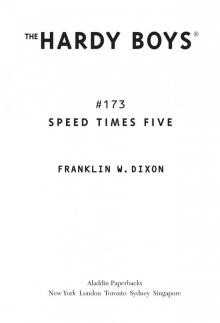 Speed Times Five
Speed Times Five What Happened at Midnight
What Happened at Midnight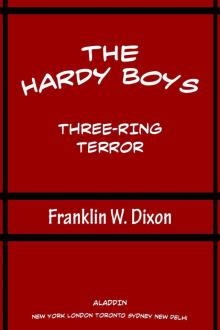 Three-Ring Terror
Three-Ring Terror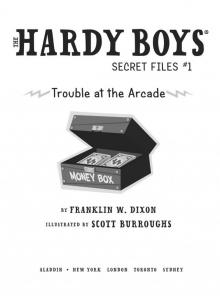 Trouble at the Arcade
Trouble at the Arcade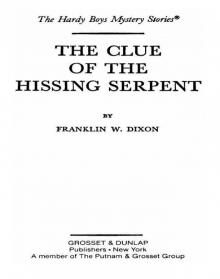 The Clue of the Hissing Serpent
The Clue of the Hissing Serpent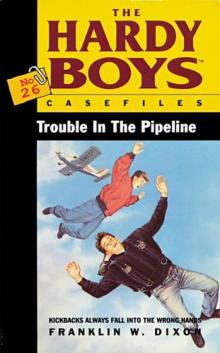 Trouble in the Pipeline
Trouble in the Pipeline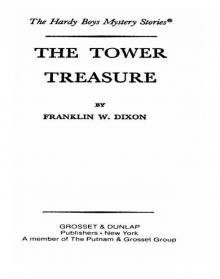 The Tower Treasure
The Tower Treasure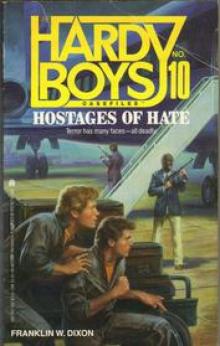 Hostages of Hate
Hostages of Hate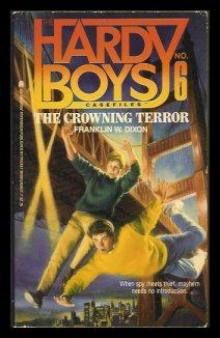 The Crowning Terror
The Crowning Terror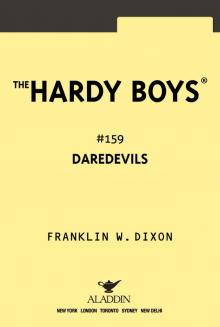 Daredevils
Daredevils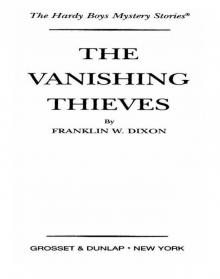 The Vanishing Thieves
The Vanishing Thieves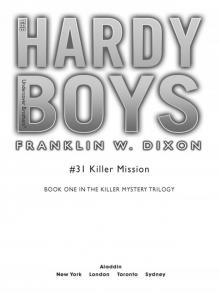 Killer Mission
Killer Mission The Mark of the Blue Tattoo
The Mark of the Blue Tattoo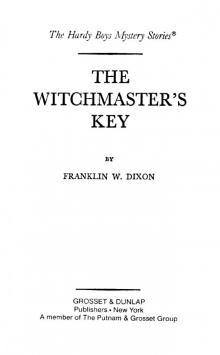 The Witchmaster's Key
The Witchmaster's Key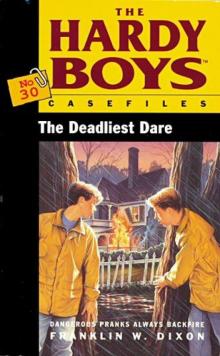 The Deadliest Dare
The Deadliest Dare Peril at Granite Peak
Peril at Granite Peak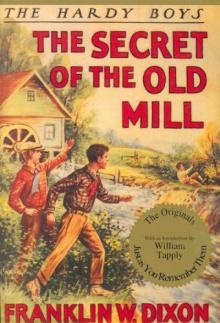 The Secret Of The Old Mill thb-3
The Secret Of The Old Mill thb-3 Rocky Road
Rocky Road The Demolition Mission
The Demolition Mission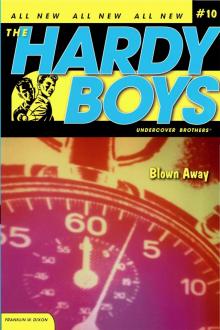 Blown Away
Blown Away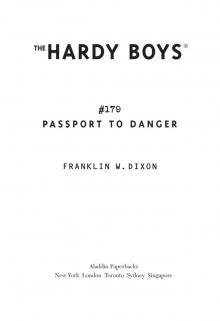 Passport to Danger
Passport to Danger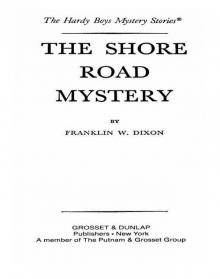 The Shore Road Mystery
The Shore Road Mystery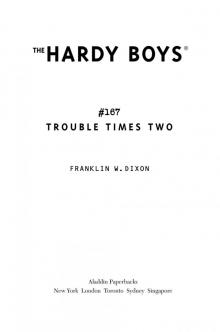 Trouble Times Two
Trouble Times Two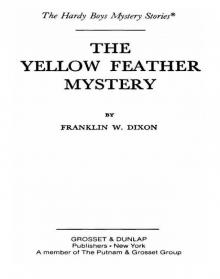 The Yellow Feather Mystery
The Yellow Feather Mystery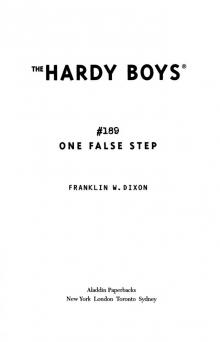 One False Step
One False Step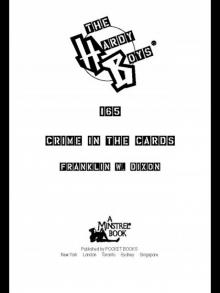 Crime in the Cards
Crime in the Cards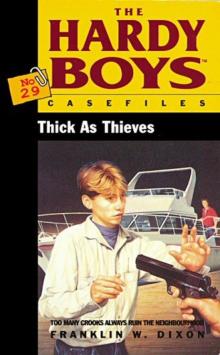 Thick as Thieves
Thick as Thieves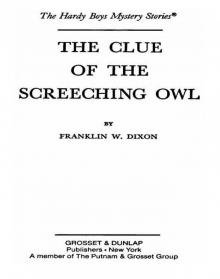 The Clue of the Screeching Owl
The Clue of the Screeching Owl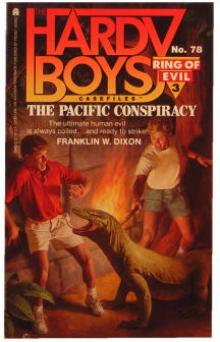 The Pacific Conspiracy
The Pacific Conspiracy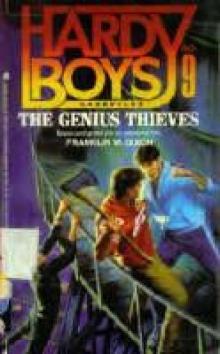 The Genius Thieves
The Genius Thieves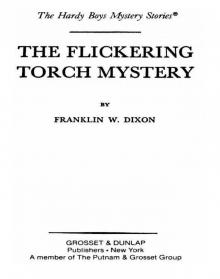 The Flickering Torch Mystery
The Flickering Torch Mystery Into Thin Air
Into Thin Air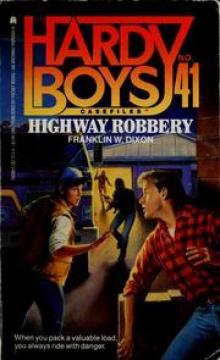 Highway Robbery
Highway Robbery Deadfall
Deadfall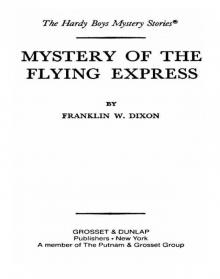 Mystery of the Flying Express
Mystery of the Flying Express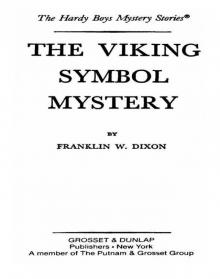 The Viking Symbol Mystery
The Viking Symbol Mystery The End of the Trail
The End of the Trail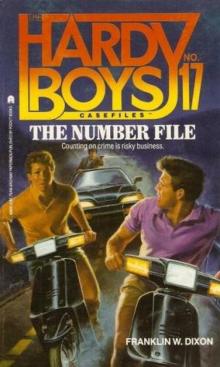 The Number File
The Number File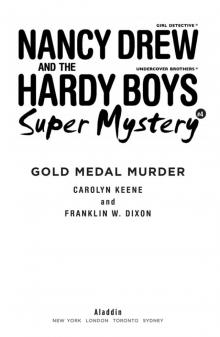 Gold Medal Murder
Gold Medal Murder Bound for Danger
Bound for Danger Collision Course
Collision Course The Madman of Black Bear Mountain
The Madman of Black Bear Mountain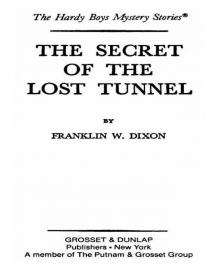 The Secret of the Lost Tunnel
The Secret of the Lost Tunnel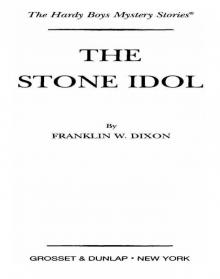 The Stone Idol
The Stone Idol The Secret of Pirates' Hill
The Secret of Pirates' Hill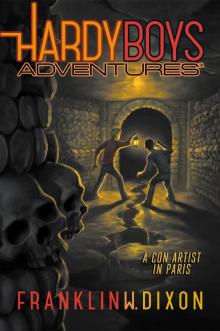 A Con Artist in Paris
A Con Artist in Paris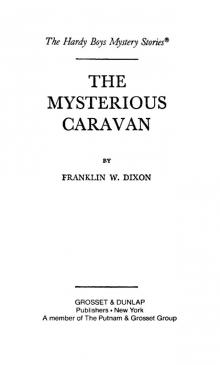 The Mysterious Caravan
The Mysterious Caravan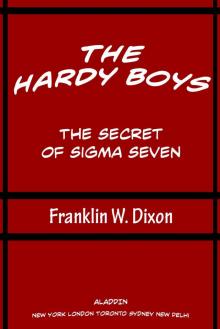 The Secret of Sigma Seven
The Secret of Sigma Seven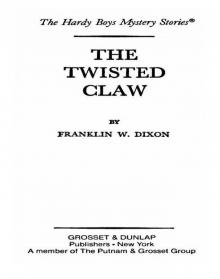 The Twisted Claw
The Twisted Claw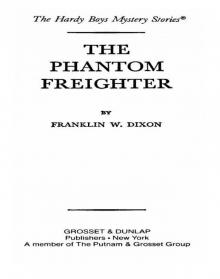 The Phantom Freighter
The Phantom Freighter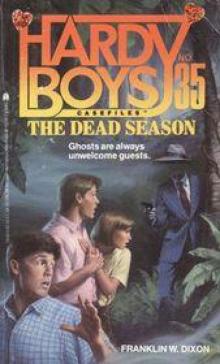 The Dead Season
The Dead Season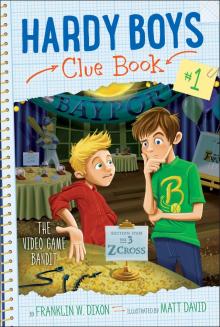 The Video Game Bandit
The Video Game Bandit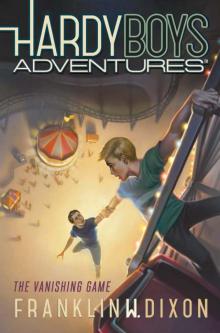 The Vanishing Game
The Vanishing Game Typhoon Island
Typhoon Island